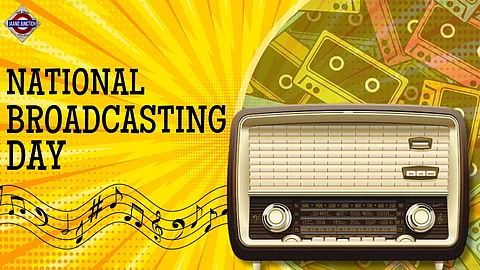

Every year on July 23rd, India celebrates National Broadcasting Day to commemorate the historical moment when the country's All India Radio (AIR) made its inaugural broadcast back in 1927. This significant occasion holds immense importance as it marks the beginning of the broadcasting era in India and pays tribute to the profound impact of radio and television on the nation's communication landscape.
The roots of National Broadcasting Day trace back to the early 20th century when broadcasting in India was in its infancy. On July 23, 1927, the then Bombay Presidency Radio Club took a pioneering step and conducted the first-ever radio broadcast from Bombay (now Mumbai). This historic broadcast featured the voice of renowned scientist and freedom fighter Dr. K.S. Krishnan, who delivered an inspiring speech on wireless technology and its potential to unite the nation. This momentous event laid the foundation for the establishment of All India Radio (AIR), which would go on to become one of the largest public broadcasting organizations in the world.
National Broadcasting Day holds immense significance as it symbolizes the democratization of information and entertainment in India. Radio broadcasting, in its early days, played a crucial role in disseminating information, fostering national unity, and promoting cultural heritage. As technology advanced, television joined the ranks of radio, further revolutionizing the way people accessed news, education, and entertainment.
Over the years, broadcasting has become an essential tool for social development, reaching even the remotest corners of the country. Through radio and television, India's diverse culture and languages find a platform to thrive, creating a sense of shared identity among its citizens.
The impact of broadcasting on Indian society has been profound. In its early years, radio served as the primary medium for disseminating information during the struggle for independence. The iconic "Tryst with Destiny" speech delivered by Jawaharlal Nehru on the eve of India's independence was broadcast live, becoming an emotional and inspiring moment for millions of Indians across the country.
As India progressed, broadcasting played a significant role in spreading awareness about government schemes, health initiatives, and social welfare programs. It served as a powerful educational tool, promoting literacy, and empowering communities with knowledge and information.
Television, which followed the footsteps of radio, brought captivating visuals into people's homes. It became an influential medium for shaping public opinion, highlighting important issues, and fostering cultural exchange. The reach of television soared, bridging the gap between urban and rural India and forging national integration.
In the digital age, broadcasting has adapted to the changing times, embracing online platforms, and streaming services. This evolution has further widened its reach, enabling global audiences to connect with India's rich culture and diverse content.
On National Broadcasting Day, various events, seminars, and workshops are organized to reflect on the journey of Indian broadcasting and its future prospects. Media professionals, artists, and policymakers come together to discuss the role of broadcasting in shaping the nation's narrative and fostering a united and informed society.
Public broadcasters, private media organizations, and community radio stations take this opportunity to showcase their contributions to society. Special programs, documentaries, and interviews with veterans from the broadcasting industry are aired to evoke nostalgia and celebrate the evolution of this powerful medium.
National Broadcasting Day is a moment of pride and gratitude, honoring the pioneers who laid the foundation for India's vibrant broadcasting ecosystem. It serves as a reminder of the significant role radio and television have played in shaping the country's collective consciousness, promoting cultural diversity, and fostering social progress.
As technology continues to evolve, broadcasting remains a dynamic and indispensable medium, catering to the ever-changing needs of a diverse and growing nation. Through this powerful medium, India's voice resonates across borders, uniting people in their shared experiences and aspirations. National Broadcasting Day is a celebration of this legacy and a reaffirmation of the immense potential of broadcasting to empower, inform, and entertain, making it an integral part of the nation's journey towards a brighter future.
